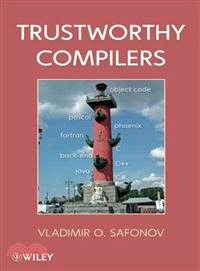Trustworthy Compilers
商品資訊
ISBN13:9780470500958
出版社:John Wiley & Sons Inc
作者:Safonov
出版日:2010/02/11
裝訂/頁數:精裝/320頁
定價
:NT$ 6610 元優惠價
:90 折 5949 元
若需訂購本書,請電洽客服 02-25006600[分機130、131]。
商品簡介
作者簡介
目次
相關商品
商品簡介
The Most Complete, Real-World Guide to Compiler
Development—and the Principles of Trustworthy Compilers
Drawing on the author's over thirty years of expertise in compiler development, research, and instruction, Trustworthy Compilers introduces and analyzes the concept of trustworthy compilers and the principles of trustworthy compiler development, and provides analytical overview of other promising research works in this area.
Vladimir Safonov shares the benefit of his long experience as a teacher and compiler development professional to explain that—even in such a well-studied area as compilers—there is still an opportunity for original results, efficient algorithms, and promising research and development. Beginning with a definition of the trustworthy compiler and a review of the history of compiler development, Trustworthy Compilers features:
A complete overview of all essential compiler topics, including lexical analysis, parsing, semantic analysis, compiler optimization, code generation, and traditional and modern approaches to runtime
Efficient, ready-to-apply algorithms for various phases of compilation, especially for semantic analysis, developed by the author and used in his real compilers
High-yield coverage of graph compilers—a novel compiler development area—plus related concepts such as graph grammars and graph compilers, and editor development tools such as DiaGen
Real projects—using examples of real compilers—that cover the key topics related to compiler development and compiling methods
A survey of novel kinds of compilation, including just-in-time (JIT) and ahead-of-time (AOT) compilation, which are characteristic of modern software development platforms Java and .NET
Sections on modern compiler tools—such as ANTLR, CoCo/R, and SableCC
Covering both classical techniques and innovative ones not covered by other books, Trustworthy Compilers helps both practicing professionals and students meet the challenge of?making compilers more trustworthy. The book's companion Web page (www.vladimirsafonov.org/trustworthycompilers) provides an overview of the book and related resources for compiler teachers and students.
Development—and the Principles of Trustworthy Compilers
Drawing on the author's over thirty years of expertise in compiler development, research, and instruction, Trustworthy Compilers introduces and analyzes the concept of trustworthy compilers and the principles of trustworthy compiler development, and provides analytical overview of other promising research works in this area.
Vladimir Safonov shares the benefit of his long experience as a teacher and compiler development professional to explain that—even in such a well-studied area as compilers—there is still an opportunity for original results, efficient algorithms, and promising research and development. Beginning with a definition of the trustworthy compiler and a review of the history of compiler development, Trustworthy Compilers features:
A complete overview of all essential compiler topics, including lexical analysis, parsing, semantic analysis, compiler optimization, code generation, and traditional and modern approaches to runtime
Efficient, ready-to-apply algorithms for various phases of compilation, especially for semantic analysis, developed by the author and used in his real compilers
High-yield coverage of graph compilers—a novel compiler development area—plus related concepts such as graph grammars and graph compilers, and editor development tools such as DiaGen
Real projects—using examples of real compilers—that cover the key topics related to compiler development and compiling methods
A survey of novel kinds of compilation, including just-in-time (JIT) and ahead-of-time (AOT) compilation, which are characteristic of modern software development platforms Java and .NET
Sections on modern compiler tools—such as ANTLR, CoCo/R, and SableCC
Covering both classical techniques and innovative ones not covered by other books, Trustworthy Compilers helps both practicing professionals and students meet the challenge of?making compilers more trustworthy. The book's companion Web page (www.vladimirsafonov.org/trustworthycompilers) provides an overview of the book and related resources for compiler teachers and students.
作者簡介
VLADIMIR O. SAFONOV is one of the leading specialists in computer science and software engineering in Russia. He is a Professor of Computer Science at St. Petersburg University and the?head of the Java Technology Laboratory at the university. In 2000 and 2001, students of his department?won the world championship for the ACM programming contest. Professor Safonov holds four U.S. software patents, four Russian software patents, and has published 120 papers and six books. He is the author of Using Aspect-Oriented Programming for Trustworthy Software Development (Wiley). He is the chair of the IEEE Region 8 Russia North-West Computer Society/Technology Management Council Joint Chapter. He was also a Microsoft Research?2005/2006 RFP winner for TWC and Secure Software Development.
目次
Preface.
Acknowledgments.
1. Introduction.
1.1. The Concept of a Trustworthy Compiler.
1.2. Kinds of Compilers.
1.3. Evolution of Java Compilers.
1.4. Compilation for .NET.
1.5. Phases of Compilation.
1.6. Overview of Compiler Development Principles and Technologies.
1.7. History of Compiler Development in the U.S.S.R. and in Russia.
Exercises to Chapter 1.
2. Theoretical Foundations and Principles of Trustworthy Compilers.
2.1. The Trustworthy Computing (TWC) Initiative.
2.2. TWC and Trustworthy Compilers.
2.3. Verified Compilers.
2.4. Spec#: Microsoft’s Approach to Verifying Compilers.
2.5. Perspectives of Verified and Verifying Compilation.
Exercises to Chapter 2.
3. Lexical Analysis and Its Trustworthiness Principles.
3.1. Token Classes.
3.2. The Output of the Lexical Analyzer.
3.3. Processing White Spaces, Comments, and New Lines.
3.4. Theoretical Models of Lexical Analysis.
3.5. Lexical Errors, Error Diagnostics, and Recovery.
3.6. Processing Identifiers and Keywords.
3.7. The Architecture of a Lexical Analyzer and the Principles of Its Implementation.
3.8. The Lexical Analyzer Generator Lex.
3.9. Lexical Analyzer Generation in ANTLR.
Exercises to Chapter 3.
4. Parsing and Trustworthy Methods of Syntax Error Recovery.
4.1. Basic Concepts and Principles of Parsing.
4.2. Recursive Descent and Simple Lookahead Mechanism.
4.3. Overview of Error Recovery in Parsing: Error Recovery for Recursive Descent.
4.4. LR(1) and LALR(1) Parsing.
4.5. Error Recovery in LR Parsing.
4.6. The Yacc Parser Generator.
4.7. The Bison Parser Generator: Generalized LR Parsing.
4.8. The Yacc++, JavaCC, SableCC, ANTLR, and CoCo/R Object-Oriented Parser Generators.
Exercises to Chapter 4.
5. Semantic Analysis and Typing: Efficient and Trustworthy Techniques.
5.1. Basic Concepts and Principles of Semantic Analysis.
5.2. Formal Model of Semantic Analysis: Attributed Grammars.
5.3. Definition Systems with Forward References and the Algorithm of Their One-Pass Analysis.
5.4. Commonly Used Semantic Attributes for Program Constructs.
5.5. Design Flaws of the Semantic Attribute Evaluation and Our Efficient Methods to Speed It Up.
5.6. Lookup—Traditional and Novel Techniques.
5.7. Typing and Type-Checking: Basic Concepts.
5.8. Representing Types at Compile Time.
5.9. Efficient Method and Algorithm to Represent and Handle Types with Structural Identity.
5.10. Type Identity and Type Compatibility.
5.11. Type-Checking, Typing Error Diagnostics, and Recovery.
5.12. Code Trustworthiness Checks During Semantic Analysis.
5.13. Checks for Context Restrictions in Semantic Analysis.
5.14. Intermediate Code Generation—Principles and Architectural Models.
5.15. Postfix (Reverse Polish) Notation.
5.16. PCC Trees.
5.17. Triples.
5.18. Summary of the Chapter.
Exercises to Chapter 5.
6. Trustworthy Optimizations.
6.1. Basic Concepts and Trustworthiness of Optimizations.
6.2. Optimizations as Mixed Computations.
6.3. Overview of the Most Common Kinds of Optimizations.
6.4. Control Flow and Data Flow Dependencies.
6.5. Static Single Assignment (SSA).
6.6. Data Structures Constructed and Used by the Optimizer.
6.7. Optimization in Sun Studio Compilers.
6.8. Optimizations of the Java Bytecode.
6.9. Optimizations of the .NET Common Intermediate Language (CIL) Code.
6.10. Optimizations during JIT Compilation.
Exercises to Chapter 6.
7. Code Generation and Runtime Data Representation.
7.1. Target Platforms for Code Generation.
7.2. Overview of Code Generation Tasks and Goals.
7.3. Specifics of Code Generation for .NET.
7.4. Specifics of Code Generation for SPARC Architecture.
7.5. Representing Types and Addressing Variables.
7.6. Representing Procedures, Functions, and Methods.
7.7. Principles of SPARC Architecture.
7.8. Example of Code Generation for SPARC Architecture.
7.9. Generation of Debugging Information.
7.10. Code Generation for Declarations (Definitions), Expressions, and Statements.
Exercises to Chapter 7.
8. Runtime, JIT, and AOT Compilation.
8.1. The Tasks of the Runtime.
8.2. The Relationship of the Runtime and the Operating System (OS).
8.3. JIT Compilation.
8.4. The Architecture of FJIT––JIT Compiler for SSCLI/Rotor.
8.5. The Architecture of Optimizing JIT Compiler for SSCLI/Rotor.
8.6. AOT Compilation.
Exercises to Chapter 8.
9. Graph Grammars and Graph Compilers.
9.1. Basic Concepts of Graph Grammars and Graph Compilers.
9.2. Categorical Approach to Graph Transformations.
9.3. Reserved Graph Grammars (RGGs).
9.4. Layered Graph Grammars.
9.5. Meta-Modeling Approach to Graph Grammars and Diameta Editor.
9.6. Hypergraph Approach to Graph Grammars in Diagen.
9.7. Graph Compiler Generation Tools.
Exercises to Chapter 9.
10. Microsoft Phoenix, Phoenix-Targeted Tools, and Our Phoenix Projects.
10.1. History of Phoenix and of Our Phoenix Projects.
10.2. Overview of Phoenix Architecture.
10.3. Phoenix-Based Tools, Passes, Phases, and Plug-Ins.
10.4. Phoenix Primitives: Strings and Names.
10.5. Phoenix Intermediate Representation (IR).
10.6. Phoenix Symbol System.
10.7. Phoenix Type System.
10.8. Data Flow Analysis, Control Flow Analysis, Graphs, and Static Single Assignment (SSA) in Phoenix.
10.9. Overview of Other Phoenix Features.
10.10. Example of a Phoenix-Based Plug-In.
10.11. Phoenix-Fete—A Compiler Front-End Development Toolkit and Environment Targeted to Phoenix.
Exercises to Chapter 10.
Conclusions.
References.
Index.
Acknowledgments.
1. Introduction.
1.1. The Concept of a Trustworthy Compiler.
1.2. Kinds of Compilers.
1.3. Evolution of Java Compilers.
1.4. Compilation for .NET.
1.5. Phases of Compilation.
1.6. Overview of Compiler Development Principles and Technologies.
1.7. History of Compiler Development in the U.S.S.R. and in Russia.
Exercises to Chapter 1.
2. Theoretical Foundations and Principles of Trustworthy Compilers.
2.1. The Trustworthy Computing (TWC) Initiative.
2.2. TWC and Trustworthy Compilers.
2.3. Verified Compilers.
2.4. Spec#: Microsoft’s Approach to Verifying Compilers.
2.5. Perspectives of Verified and Verifying Compilation.
Exercises to Chapter 2.
3. Lexical Analysis and Its Trustworthiness Principles.
3.1. Token Classes.
3.2. The Output of the Lexical Analyzer.
3.3. Processing White Spaces, Comments, and New Lines.
3.4. Theoretical Models of Lexical Analysis.
3.5. Lexical Errors, Error Diagnostics, and Recovery.
3.6. Processing Identifiers and Keywords.
3.7. The Architecture of a Lexical Analyzer and the Principles of Its Implementation.
3.8. The Lexical Analyzer Generator Lex.
3.9. Lexical Analyzer Generation in ANTLR.
Exercises to Chapter 3.
4. Parsing and Trustworthy Methods of Syntax Error Recovery.
4.1. Basic Concepts and Principles of Parsing.
4.2. Recursive Descent and Simple Lookahead Mechanism.
4.3. Overview of Error Recovery in Parsing: Error Recovery for Recursive Descent.
4.4. LR(1) and LALR(1) Parsing.
4.5. Error Recovery in LR Parsing.
4.6. The Yacc Parser Generator.
4.7. The Bison Parser Generator: Generalized LR Parsing.
4.8. The Yacc++, JavaCC, SableCC, ANTLR, and CoCo/R Object-Oriented Parser Generators.
Exercises to Chapter 4.
5. Semantic Analysis and Typing: Efficient and Trustworthy Techniques.
5.1. Basic Concepts and Principles of Semantic Analysis.
5.2. Formal Model of Semantic Analysis: Attributed Grammars.
5.3. Definition Systems with Forward References and the Algorithm of Their One-Pass Analysis.
5.4. Commonly Used Semantic Attributes for Program Constructs.
5.5. Design Flaws of the Semantic Attribute Evaluation and Our Efficient Methods to Speed It Up.
5.6. Lookup—Traditional and Novel Techniques.
5.7. Typing and Type-Checking: Basic Concepts.
5.8. Representing Types at Compile Time.
5.9. Efficient Method and Algorithm to Represent and Handle Types with Structural Identity.
5.10. Type Identity and Type Compatibility.
5.11. Type-Checking, Typing Error Diagnostics, and Recovery.
5.12. Code Trustworthiness Checks During Semantic Analysis.
5.13. Checks for Context Restrictions in Semantic Analysis.
5.14. Intermediate Code Generation—Principles and Architectural Models.
5.15. Postfix (Reverse Polish) Notation.
5.16. PCC Trees.
5.17. Triples.
5.18. Summary of the Chapter.
Exercises to Chapter 5.
6. Trustworthy Optimizations.
6.1. Basic Concepts and Trustworthiness of Optimizations.
6.2. Optimizations as Mixed Computations.
6.3. Overview of the Most Common Kinds of Optimizations.
6.4. Control Flow and Data Flow Dependencies.
6.5. Static Single Assignment (SSA).
6.6. Data Structures Constructed and Used by the Optimizer.
6.7. Optimization in Sun Studio Compilers.
6.8. Optimizations of the Java Bytecode.
6.9. Optimizations of the .NET Common Intermediate Language (CIL) Code.
6.10. Optimizations during JIT Compilation.
Exercises to Chapter 6.
7. Code Generation and Runtime Data Representation.
7.1. Target Platforms for Code Generation.
7.2. Overview of Code Generation Tasks and Goals.
7.3. Specifics of Code Generation for .NET.
7.4. Specifics of Code Generation for SPARC Architecture.
7.5. Representing Types and Addressing Variables.
7.6. Representing Procedures, Functions, and Methods.
7.7. Principles of SPARC Architecture.
7.8. Example of Code Generation for SPARC Architecture.
7.9. Generation of Debugging Information.
7.10. Code Generation for Declarations (Definitions), Expressions, and Statements.
Exercises to Chapter 7.
8. Runtime, JIT, and AOT Compilation.
8.1. The Tasks of the Runtime.
8.2. The Relationship of the Runtime and the Operating System (OS).
8.3. JIT Compilation.
8.4. The Architecture of FJIT––JIT Compiler for SSCLI/Rotor.
8.5. The Architecture of Optimizing JIT Compiler for SSCLI/Rotor.
8.6. AOT Compilation.
Exercises to Chapter 8.
9. Graph Grammars and Graph Compilers.
9.1. Basic Concepts of Graph Grammars and Graph Compilers.
9.2. Categorical Approach to Graph Transformations.
9.3. Reserved Graph Grammars (RGGs).
9.4. Layered Graph Grammars.
9.5. Meta-Modeling Approach to Graph Grammars and Diameta Editor.
9.6. Hypergraph Approach to Graph Grammars in Diagen.
9.7. Graph Compiler Generation Tools.
Exercises to Chapter 9.
10. Microsoft Phoenix, Phoenix-Targeted Tools, and Our Phoenix Projects.
10.1. History of Phoenix and of Our Phoenix Projects.
10.2. Overview of Phoenix Architecture.
10.3. Phoenix-Based Tools, Passes, Phases, and Plug-Ins.
10.4. Phoenix Primitives: Strings and Names.
10.5. Phoenix Intermediate Representation (IR).
10.6. Phoenix Symbol System.
10.7. Phoenix Type System.
10.8. Data Flow Analysis, Control Flow Analysis, Graphs, and Static Single Assignment (SSA) in Phoenix.
10.9. Overview of Other Phoenix Features.
10.10. Example of a Phoenix-Based Plug-In.
10.11. Phoenix-Fete—A Compiler Front-End Development Toolkit and Environment Targeted to Phoenix.
Exercises to Chapter 10.
Conclusions.
References.
Index.
主題書展
更多
主題書展
更多書展今日66折
您曾經瀏覽過的商品
購物須知
外文書商品之書封,為出版社提供之樣本。實際出貨商品,以出版社所提供之現有版本為主。部份書籍,因出版社供應狀況特殊,匯率將依實際狀況做調整。
無庫存之商品,在您完成訂單程序之後,將以空運的方式為你下單調貨。為了縮短等待的時間,建議您將外文書與其他商品分開下單,以獲得最快的取貨速度,平均調貨時間為1~2個月。
為了保護您的權益,「三民網路書店」提供會員七日商品鑑賞期(收到商品為起始日)。
若要辦理退貨,請在商品鑑賞期內寄回,且商品必須是全新狀態與完整包裝(商品、附件、發票、隨貨贈品等)否則恕不接受退貨。
























